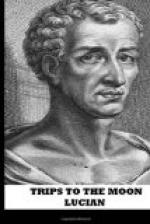Ctesias the Cnidian, son of Ctesiochus, wrote an account of India and of things there, which he never saw himself, nor heard from anybody else. Iambulus also has acquainted us with many wonders which he met with in the great sea, and which everybody knew to be absolute falsehoods: the work, however, was not unentertaining. Besides these, many others have likewise presented us with their own travels and peregrinations, where they tell us of wondrous large beasts, savage men, and unheard-of ways of living. The great leader and master of all this rhodomontade is Homer’s “Ulysses,” who talks to Alcinous about the winds {75} pent up in bags, man-eaters, and one-eyed Cyclops, wild men, creatures with many heads, several of his companions turned into beasts by enchantment, and a thousand things of this kind, which he related to the ignorant and credulous Phaeacians.
These, notwithstanding, I cannot think much to blame for their falsehoods, seeing that the custom has been sometimes authorised, even by the pretenders to philosophy: I only wonder that they should ever expect to be believed: being, however, myself incited, by a ridiculous vanity, with the desire of transmitting something to posterity, that I may not be the only man who doth not indulge himself in the liberty of fiction, as I could not relate anything true (for I know of nothing at present worthy to be recorded), I turned my thoughts towards falsehood, a species of it, however, much more excusable than that of others, as I shall at least say one thing true, when I tell you that I lie, and shall hope to escape the general censure, by acknowledging that I mean to speak not a word of truth throughout. Know ye, therefore, that I am going to write about what I never saw myself, nor experienced, nor so much as heard from anybody else, and, what is more, of such things as neither are, nor ever can be. I give my readers warning, therefore, not to believe me.
* * * *
Once upon a time, {77} then, I set sail from the Pillars of Hercules, and getting into the Western Ocean, set off with a favourable wind; the cause of my peregrination was no more than a certain impatience of mind and thirst after novelty, with a desire of knowing where the sea ended, and what kind of men inhabited the several shores of it; for this purpose I laid in a large stock of provisions, and as much water as I thought necessary, taking along with me fifty companions of the same mind as myself. I prepared withal, a number of arms, with a skilful pilot, whom we hired at a considerable expense, and made our ship (for it was a pinnace), as tight as we could in case of a long and dangerous voyage.




